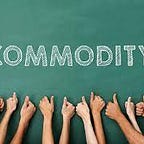How to Trade Agricultural Commodities?
According to commodity trader — Rowan Relton, impacts on global commodities have been felt immediately by consumers, with delays in the delivery of well-known products and market concerns over the supply of oil and other commodities to many countries.
Today in this article, the commodity trading expert — Rowan Relton, will tell you about tips on how to start trading agricultural commodities and everything that you need to know before starting trading agricultural commodities.
Why Trade Agricultural Commodities?
1. Trading Leverage
Because contracts are traded on margins, dealers can leverage their trades for a fraction of the contract’s true value.
2. Liquidity
It’s just as simple to sell or purchase futures, and traders may readily liquidate their positions anytime they need to.
3. Transparency
The Trading Platform displays real-time market values in a clear manner.
4. Market Coverage
Agricultural commodities come in a variety of forms, allowing you to put your trading talents and knowledge to work on the most suitable asset and market.
Ways to Start Trading Agricultural Commodities
Such an occurrence would appear to be unavoidable, but the worldwide market would not be well-suited, as in the case of Coronavirus (COVID-19). Hundreds of cargo ships are still apprehensive about their future journeys, resulting in longer delivery times and higher expenses.
Furthermore, because to the interruption of procurement caused by the COVID-19 pandemic, there were pre-existing delays for items that were already waiting to be loaded, as well as when the condition of commodities was confronting a lack of containers. All of this involves a key issue that is already causing substantial friction in the marketplace.
Agricultural product commerce, such as natural rubber, is still an unpredictably volatile market that relies on conventional paper methods in many circumstances. Almost all pricing categories, from producers to processors, retailers, and retailers to consumers, include delays and inefficiencies. This increases the risk of inflation and volatility, resulting in areas where performance may be improved across the whole supply chain, providing additional opportunity for all market players. The existing hazards of moving agricultural assets will be addressed by more open access to trade financing and insurance, as well as more alternatives in suitable trade agreements and futures.
All of this may be fixed by combining superior technology with professional knowledge to guarantee that all market segments are linked and all known data points are incorporated. For example, digital transformation may aid in the funding and organization of commercial financial transactions, taking into account hazards associated with consignment, particularly in the transit of commodities.
1. Technology to Drive Efficiency in the Sale of Goods
The technology is being used endlessly in the agricultural commodity industry and will eventually be promoted. The Boston Consulting Group has indicated that $ 70 billion will be generated from rising costs from real estate investments that include appropriate technology. In addition, the COVID-19 epidemic has created additional momentum for change, with new digital remote operating systems demonstrating the efficiency of many traditional companies. Eventually, a growing number of Internet connections are reaching rural areas where agricultural products are grown, such as natural rubber. This makes digital connectivity and its compliance benefits a reality for many market participants.
2. Better Access to Information and more Advanced Party Frameworks
The capacity to make the best judgments by receiving the correct information, at the right time, and in the right way is one of the primary benefits for all market players who utilize digital technology, says Rowan Relton. Another advantage is the availability of large data and data for processing how agreements might be structured such that profits are shared among all market players. To preserve set market pricing, for example, or to design stock market methods to protect producer money, for example. Because of the inherent risks associated in the transit of products, as mentioned in the Suez Canal prohibition, digital technologies and platforms provide an excellent setting for these operations to take place.
3. Effectiveness in Improving the Margins of Big Business
Digital inclusion is critical for reducing fraud risks associated with CAD paper methods and for speeding up these procedures. Furthermore, cloud-based security solutions can offer non-standard companies with access at any time and from any location. Faster pricing, trading, real-time data interchange, comprehensive risk management, and smooth post-trade processing will all be possible with contemporary technology.
Small firms’ inability to invest in technology has hampered the adoption of digital technologies in the agricultural commodities market. However, with today’s independent, collaborative platforms, this is no longer an issue. Small companies may now use pay-as-you-go models to expand their profile and take advantage of organized services and support services, such as automated contracts, financing, and marketing access to global markets, without incurring past expenditures.
4. Technology is the Future of Agricultural Goods
Using technology can grow genes and develop new methods, support the natural rubber industry in its recovery and keep it in its next growing season. Allows the information to be used effectively, in a timely manner, to eliminate conflicts within purchases, to drive better decisions and better outcomes for all, and to ensure that there are better acquisition and pricing plans in place.
Wrap-up
You’ll have a far higher chance of succeeding if you do your homework and understand the markets you’re trading, as well as prevent overtrading or “gambling.” You could also get wealthy if you can become an expert in your chosen commodities market.
Aligning the right organization with the right opportunity — as a result of your own — of big business as a whole is now possible. This provides support to the agricultural commodity industry to overcome its recent decline and is more focused on sustainable development goals.
Here in the above article, Rowan Relton — commodity trading expert, talked about some tips on how you can start trading agricultural commodities and everything you need to know about agricultural commodities before starting to trade them.
